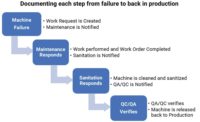The Bottom Line:
- Shortage of employees
- Training not happening effectively or quick enough
- New online courses
The snack and bakery industries are constantly changing. Due to that, employees will always need updated training.
“Continuing shortage of qualified employees and a highly competitive job market are resulting in unprecedented rates of attrition, temporary hiring, and mass hiring of new employees,” says Steve Robert, global vice president of sales, marketing, and production innovation, AIB International, Manhattan, KS. “This is prompting some manufacturers to allocate resources from food safety and sanitation to production or, in general, having employees take on extra responsibility where in the past, there was a dedicated resource.”
“Current employees are working as hard as they can and plants are unable to train their food safety and sanitation personnel quickly enough, resulting in inefficient processes and a higher probability of missing key items that compromise food safety and product quality,” Robert warns.
AIB International recently launched a food safety and sanitation online course. Mid-level managers in the food supply chain can strengthen their knowledge in an easy-to-follow, modular format.
“Sanitation is absolutely critical in this industry, and there is a real shortage of well-qualified people in today’s market. The industry needs help, especially with the onslaught of mass hiring across the globe,” adds Robert. “Our food safety and sanitation course was created to fill a need in the market, and we used instructional experts who leveraged neuroscience principles for adult learning to help ensure that the training offers highly engaging content that can be reviewed at the participant’s own pace.”
He says that the food safety and sanitation course is an all-encompassing 24-module program designed to help mid-level managers and supervisors in the food supply chain more effectively handle their food safety systems. Due to its unique curriculum and design, participants can select from the 24 modules and complete those that are relevant to their needs or responsibilities.
“Modules were designed to meet the different needs of the food supply chain. For example, pest control companies can benefit from this training by selecting the eight modules that will provide their personnel with the knowledge needed to support an integrated pest management program in a food facility,” he comments. “Additionally, U.S. manufacturers and those exporting to the U.S. can use the content in these modules to gain a greater understanding of FDA regulations, industry best practices, and food safety principles, while those interested in other international markets can choose the non-FDA related modules to expand their knowledge of sanitation and food safety.”
Individuals in different roles within the food supply chain can benefit from the new training by selecting the modules that are most relevant to them. No limit is placed on the number of modules an individual can complete.
Vanessa Vial, assistant director of education, American Bakers Association (ABA), Washington, D.C., says that this year, ABA’s Bakers Manufacturing Academy launched an advanced training program for bakery’s most common product: white pan bread.
“The online course, available in both English and Spanish, is divided into two sections comprising 20 modules. The lessons focus on each step of the manufacturing process, from scaling through the packaging of the finished product. The ideal students for this course are those who want to manage or supervise and bakery shift, department, or facility,” she explains. “The flexibility of the Bakers Manufacturing Academy (BMA) allows entire corporations to integrate our training enterprise-wide by activating each bakery/facility location and enroll their workforce into programs that work best for their employee training goals.”
Robert says that with all the challenges the food supply chain is currently facing—for example, labor shortages and tight timelines—training should still be a top priority.
“Regardless of the industry, food safety and prerequisite programs play a lead role in every aspect of your business. Training has never been more important than it is today. Reduced staff means other employees are wearing more hats than ever before, and while production is running at record levels, this inherently raises risk levels,” he explains.
“I can’t stress enough how critical training is, especially for positions that are responsible for proactively combatting microbiological and allergen management concerns, such as sanitation. Training is key to building and fostering an enhanced organizational culture that prioritizes food safety,” Robert says.
“Ongoing education is an investment that will shield your processes and provide the essential tools to face regulatory evaluations with confidence.”





